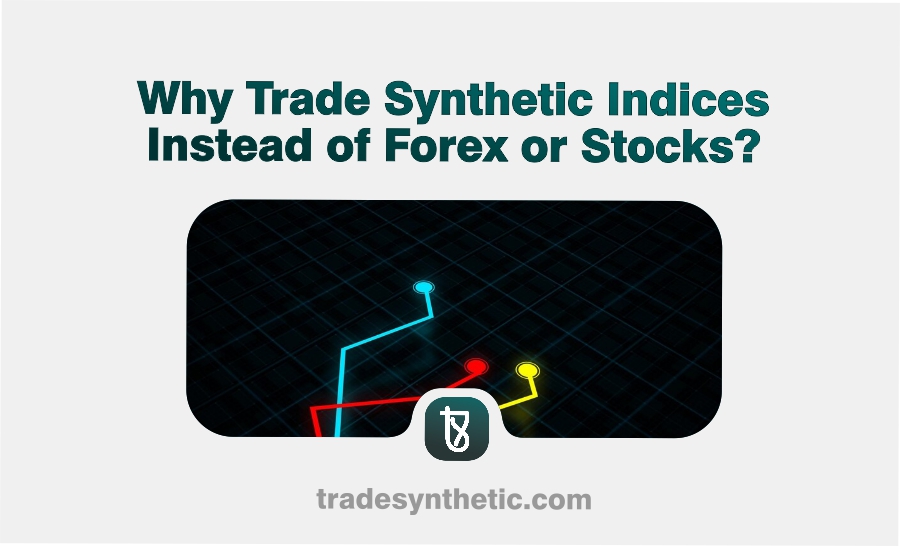Trading in financial markets has evolved, providing traders with new opportunities beyond traditional Forex and stock markets. One such innovation is synthetic indices, which have gained popularity due to their unique advantages. But why should you consider trading synthetic indices instead of Forex or stocks? This guide explores the benefits of synthetic indices and how they compare to traditional markets.
What Are Synthetic Indices?
Synthetic indices are market instruments that simulate real-world market behaviors but are not influenced by external factors such as economic news, political events, or central bank policies. These indices are generated using advanced mathematical models and are designed to mimic price movements of traditional assets like stocks and Forex.
Differences Between Synthetic Indices, Forex, and Stocks
To make an informed trading decision, it’s important to understand the differences between these markets.
| Feature | Synthetic Indices | Forex | Stocks |
| Market Influence | No external influence | Affected by economic news and policies | Driven by company performance and economy |
| Trading Hours | 24/7 availability | 24/5 | Limited to stock exchange hours |
| Liquidity | High | High | Medium to high |
| Leverage Options | Available | Available | Limited |
| Volatility Levels | Fixed and predictable | Varies | Varies |
Advantages of Trading Synthetic Indices
1. Independence from Market Events
Unlike Forex and stocks, synthetic indices are not influenced by major geopolitical events, economic downturns, or central bank interventions. This makes them ideal for traders who prefer a controlled trading environment.
2. 24/7 Trading Availability
Forex markets operate 24/5, while stock markets have fixed trading hours. Synthetic indices, however, are available 24/7, allowing traders to enter and exit trades at any time.
3. Consistent Volatility Levels
Different synthetic indices come with predefined volatility levels, giving traders the flexibility to choose an index that matches their risk tolerance.
4. No Price Manipulation
Since synthetic indices are generated through algorithms, they are free from market manipulation, insider trading, or liquidity issues that often affect stocks and Forex markets.
Challenges of Trading Synthetic Indices
Despite their advantages, synthetic indices also have some challenges that traders should consider.
1. Higher Spreads Compared to Forex
Some synthetic indices have higher spreads than major Forex pairs, which may impact profitability for scalpers.
2. Dependence on Broker Reliability
Since synthetic indices are exclusively available on platforms like Deriv, traders rely entirely on the broker’s technology and fairness in price generation.
3. Lack of Fundamental Analysis
Traditional markets allow traders to use fundamental analysis, such as economic reports and earnings data. Synthetic indices, however, rely solely on technical analysis.
How to Get Started with Synthetic Indices
If you decide to trade synthetic indices, here are the steps to get started:
- Choose a Reliable Broker – Deriv is the leading platform offering synthetic indices.
- Create a Demo Account – Practice risk-free before committing real funds.
- Learn Technical Analysis – Since synthetic indices lack fundamental data, mastering chart patterns and indicators is crucial.
- Develop a Risk Management Plan – Set stop-loss orders and use proper leverage to manage risks.
- Start Trading with a Live Account – Once confident, deposit funds and begin trading cautiously.
Conclusion
As I conclude, the amazing thing about Synthetic indices is that it offers a unique trading experience that is independent of real-world events, available 24/7, and free from price manipulation. While they provide numerous benefits, traders must also be aware of potential risks.
If you prefer a trading environment where technical analysis reigns supreme and external factors don’t disrupt price movements, synthetic indices may be a better choice than Forex or stocks. However, proper risk management and a solid trading strategy are essential for long-term success.
Frequently Asked Questions (FAQs)
Are synthetic indices better than Forex?
- It depends on your trading style. If you prefer stability and independence from economic events, synthetic indices might be better. If you rely on news and fundamental analysis, Forex is a better option.
Can I trade synthetic indices without leverage?
- Yes, you can trade without leverage, but using leverage allows you to maximize profits (and risks) based on your capital.
Are synthetic indices regulated?
- Synthetic indices are offered by brokers like Deriv, which operate under regulatory oversight. However, they are not tied to traditional financial institutions.
How do I choose the best synthetic index to trade?
- Consider your risk tolerance. If you prefer low-risk trading, opt for lower volatility indices. If you can handle high risk, go for higher volatility indices.
Can I trade synthetic indices with a small deposit?
- Yes, Deriv allows traders to start with a small deposit, making synthetic indices accessible to beginners.










